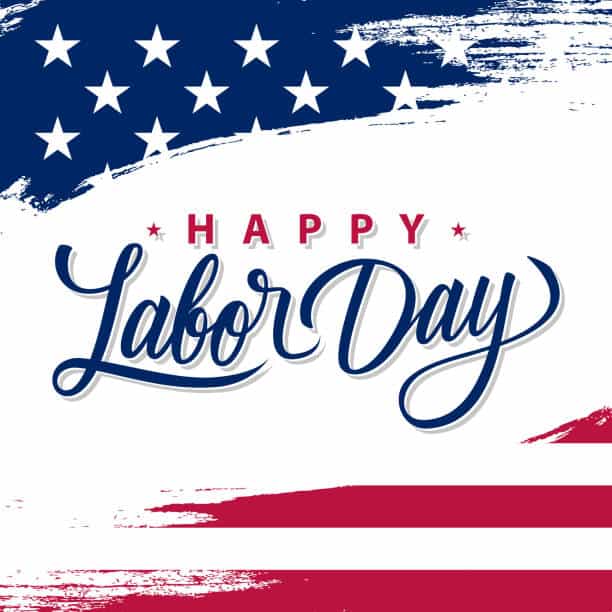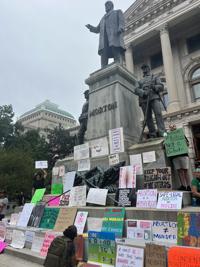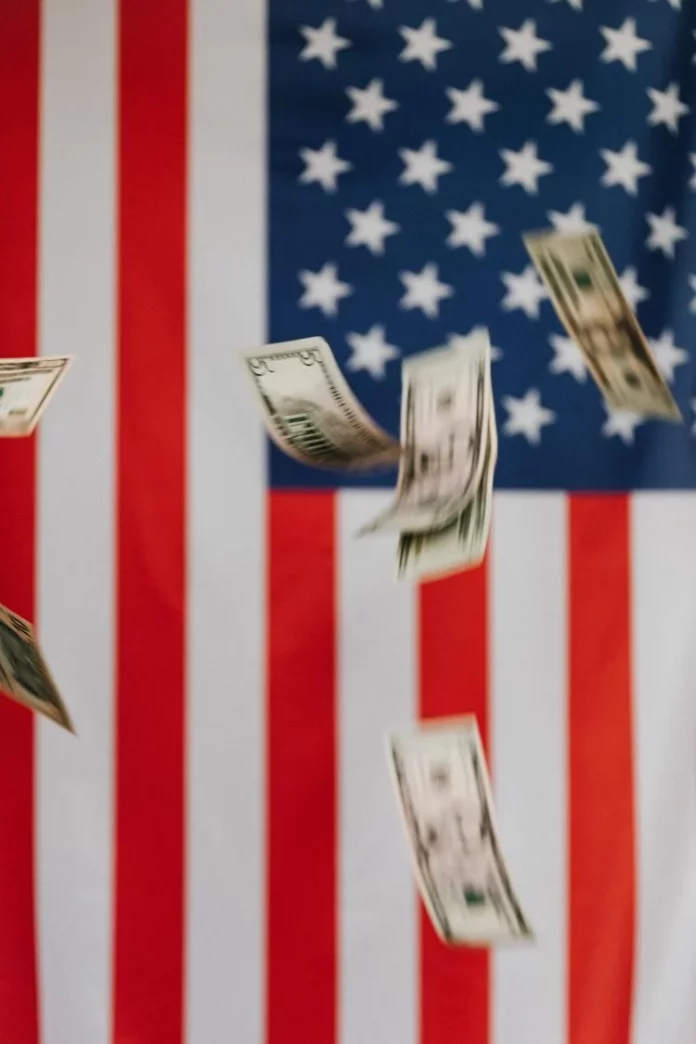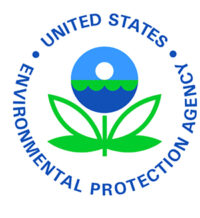HAPPY LABOR DAY TO EVERYONE
HISTORY OF LABOR DAY
Before it was a federal holiday, Labor Day was recognized by labor activists and individual states. After municipal ordinances were passed in 1885 and 1886, a movement developed to secure state legislation. New York was the first state to introduce a bill, but Oregon was the first to pass a law recognizing Labor Day, on February 21, 1887. In 1887, four more states – Colorado, Massachusetts, New Jersey, and New York – passed laws creating a Labor Day holiday. By the end of the decade Connecticut, Nebraska, and Pennsylvania had followed suit. By 1894, 23 more states had adopted the holiday, and on June 28, 1894, Congress passed an act making the first Monday in September of each year a legal holiday.
McGuire v. Maguire: Who Founded Labor Day?
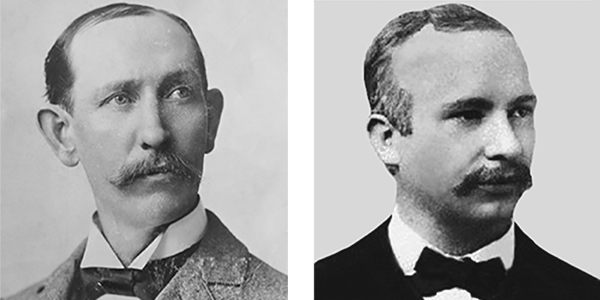
Who first proposed the holiday for workers? It’s not entirely clear, but two workers can make a solid claim to the Founder of Labor Day title.
Some records show that in 1882, Peter J. McGuire, general secretary of the Brotherhood of Carpenters and Joiners and a co-founder of the American Federation of Labor, suggested setting aside a day for a “general holiday for the laboring classes” to honor those “who from rude nature have delved and carved all the grandeur we behold.”
But Peter McGuire’s place in Labor Day history has not gone unchallenged. Many believe that machinist Matthew Maguire, not Peter McGuire, founded the holiday.
Recent research seems to support the contention that Matthew Maguire, later the secretary of Local 344 of the International Association of Machinists in Paterson, New Jersey, proposed the holiday in 1882 while serving as secretary of the Central Labor Union in New York.
According to the New Jersey Historical Society, after President Cleveland signed the law creating a national Labor Day, the Paterson Morning Call published an opinion piece stating that “the souvenir pen should go to Alderman Matthew Maguire of this city, who is the undisputed author of Labor Day as a holiday.” Both Maguire and McGuire attended the country’s first Labor Day parade in New York City that year.
The First Labor Day
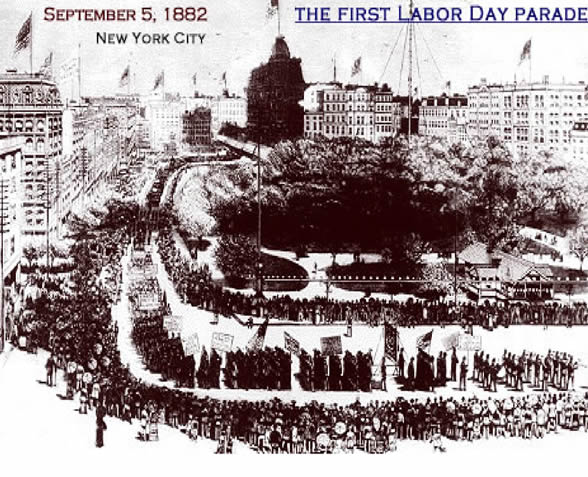
The first Labor Day holiday was celebrated on Tuesday, September 5, 1882, in New York City, in accordance with the plans of the Central Labor Union. The Central Labor Union held its second Labor Day holiday just a year later, on September 5, 1883.
By 1894, 23 more states had adopted the holiday, and on June 28, 1894, President Grover Cleveland signed a law making the first Monday in September of each year a national holiday.
A Nationwide Holiday
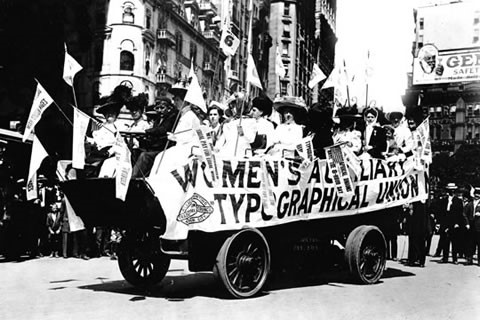
Many Americans celebrate Labor Day with parades, picnics and parties – festivities very similar to those outlined by the first proposal for a holiday, which suggested that the day should be observed with – a street parade to exhibit “the strength and esprit de corps of the trade and labor organizations” of the community, followed by a festival for the recreation and amusement of the workers and their families. This became the pattern for the celebrations of Labor Day.
Speeches by prominent men and women were introduced later, as more emphasis was placed on the economic and civic significance of the holiday. Still later, by a resolution of the American Federation of Labor convention of 1909, the Sunday preceding Labor Day was adopted as Labor Sunday and dedicated to the spiritual and educational aspects of the labor movement.
American labor has raised the nation’s standard of living and contributed to the greatest production the world has ever known and the labor movement has brought us closer to the realization of our traditional ideals of economic and political democracy. It is appropriate, therefore, that the nation pays tribute on Labor Day to the creator of so much of the nation’s strength, freedom, and leadership – the American worker.
VANDERBURGH COUNTY COUNCILÂ Â AGENDAÂ
 AGENDA Of VANDERBURGH COUNTY COUNCIL On September 7, 2022, at 8:30 A.M. In Room 301Â
1. OPENING OF MEETINGÂ
2. ATTENDANCE ROLL CALLÂ
3. PLEDGE OF ALLEGIANCEÂ
4. INVOCATIONÂ
5. APPROVAL OF MINUTES:Â
• July 27, 2022 Personnel & FinanceÂ
• August 17, 2022 Council MeetingÂ
• August 17 & August 18, 2022 Budget HearingsÂ
-
- 6. PERSONNEL REQUESTS: (A) Assessor 1. Request to fill vacancy for Real Estate Deputy Residential II 10001090-109139Â
- 2. Request for advanced Step 3 placement Real Estate/PTABOA Deputy V 10001090-109150Â
- (B) Jail 1. Request to reclassify Confinement Officer line 10001320-132081 to Confinement Officer Staff SergeantÂ
- (C) Burdette Park 1. Request to fill vacancy for Maintenance 10001450-145125Â
- (D) Public Defender 1. Request to create and fill new full-time Public Defender line 10001420-142119Â
- (E) Cumulative Bridge 1. Request to increase hourly pay rate for PT Paving Inspector 11350000-199000Â
- (F) Health Department 1. Request to fill vacancy for Supervisor STD/HIV/AIDS 11590000-115938Â
- (G) Health Department – WIC 1. Request to increase PT hourly pay for PRN Clerk 84030000-199000Â
- 2. Request to increase PT hourly pay for Breast-Feeding Coordinator 84030000-199000Â
- 3. Request to increase PT hourly pay for Health Educator 84030000-199000Â
- 4. Request to change title from Administrative Aide 84030000-840319 to Intake Coordinator and reclassify from COMOT IV to PATMEDÂ
- 5. Request to change title from Administrative Aide 84030000-840321 to Intake Coordinator and reclassify from COMOT IV to PATMEDÂ
- (H) Health Department – Lactation 1. Request to increase PT hourly pay for three Breast-feeding Peer Counselors 84060000-199000Â
- (I) Health Department – My Healthy Baby Grant 1. Request to create one-time stipend line 94190000-941916 for PT Pre to 3 Public Health Nurse (Safety Pin Grant 94150000-199000)Â
- (J) Health Department – Issues & Challenges Grant 1. Request to create Community Health Worker line 94210000-942111 and fill vacancy.Â
- 2. Request to create Community Health Worker line 94210000-942112 and fill vacancy.Â
- 3. Request to create PT Administrative Aide line 94210000-199000 and fill vacancy.Â
-
- (K) Work Release – User Fees 1. Request to create two PT positions line 25050000-199000 and fill vacancy.Â
- (L) Superior Court -INDOC Grant 1. Request to fill vacancy for PT Residential Officer 93040000/93140000-199000Â
- (M) Superior Court – INDOC Treatment Court & Work Release Grant 1. Request to increase hourly pay for four PT positions paid from 93040000/93140000-199000 and for four PT positions paid from 93170000-199000 and 93180000-199000.Â
- (N) Prosecutor-Innovation Prosecution Solutions Grant 1. Request to fill vacancy for PT Student Intern 82020000-820202Â
- (O) Prosecutor-Cyber Crimes Unit Grant 1. Request to fill vacancy for PT Student Investigator 82080000-820815Â
- (P) Area Plan 1. Request to fill vacancy for Zoning Enforcement Officer 10001240-124122Â
- 2. Request referral to consultant for review and recommendation for Zoning Administrator 10001240-124114Â
- 3. Request to create new position for Assistant Zoning Administrator/Planner and referral to consultant for review and recommendationÂ
- (B) SheriffÂ
- (C) CoronerÂ
- (D) Public DefenderÂ
- (E) Old National Events PlazaÂ
- (F) Burdette ParkÂ
- (G) CCD/Burdette ParkÂ
- (H) LIT/PS – Superior Ct WITHDRAWNÂ
- (I) County HighwayÂ
- (J) Superior Court SupplementalÂ
- (K) COIT/SheriffÂ
- (L) COIT/Superintendent of Co. BuildingsÂ
7. APPROPRIATION ORDINANCE:Â
8. REPEAL: (A) LIT/Public Safety –Sheriff
-
- 9. TRANSFERS: (A) CoronerÂ
- (B) ProsecutorÂ
- (C) JailÂ
- (D) Superior CourtÂ
- (E) Sales Disclosure Fees – AssessorÂ
- (F) Health DepartmentÂ
-
- 10. SPECIAL APPROPRIATION: (A) Solid Waste Management District FundÂ
- 11. NEW BUSINESS: (A) Public Hearing/2023 Evansville-Vanderburgh Airport Authority BudgetÂ
- (B) Public Hearing/2023 Solid Waste BudgetÂ
- (C) Presentation of 2023 Civil Taxing Unit BudgetsÂ
- 12. AMENDMENTS TO SALARY ORDINANCE:Â
13. PUBLIC COMMENTÂ
14. REMINDER UPCOMING MEETING DATES/TIMES:Â
Personnel & Finance September 28, 2022 @ 8:30 a.m.Â
County Council meeting October 5, 2022 @ 8:30 a.m.Â
County Council Budget Adoption October 5, 2022 @ 9:00 a.m.Â
15. ADJOURNMENTÂ
Nonpartisan Group Ranks Indiana’s Transparency And Campaign Finance Laws Last In U.S.
Nonpartisan Group Ranks Indiana’s Transparency And Campaign Finance Laws Last In U.S.
- By Jack Sells, TheStatehouseFile.com
- Sep 4, 2022 Updated Sep 1, 2022
INDIANAPOLIS—When it comes to transparency and the regulation of contributions to political campaigns, Indiana ranks last in the nation, according to Coalition for Integrity.
The nonpartisan nonprofit group ranked states based on 10 criteria for its State Campaign Finance Index 2022, and Indiana scored 38.33 out of 100. The state of Washington topped the list at 83.99.
Coalition for Integrity takes into account who is in charge of election laws in each state; the amount of money individuals, corporations, and unions can give to candidates or political parties; and the disclosure requirements for contributions, among other things.
The CEO of Coalition for Integrity, Shruti Shah, told The Statehouse File that the purpose of the index is to “help citizens understand a little bit better how their state’s campaign finance rules and regulations match up to others†and “give reform-minded legislators with a view to what other states are doing so if they’re trying to enact legislation, they have someplace to look.â€
Indiana has an election commission with four members appointed for four years by the governor. In general, individuals, political parties, and political action committees can give unlimited money to candidates, while unions and corporations are limited to $22,000 a year.
In Washington, a five-member Public Disclosure Commission is also appointed by the governor but differs from Indiana in that members can be removed for “neglect of duty or misconduct in office.â€
Coalition For Integrity Rankings, By state
Rankings according to Coalition for Integrity. There are 51 because of the District of Columbia…
The northwestern state also limits individuals, corporations, unions, and PACs to $2,000 for statewide candidates and $1,000 for legislative candidates per election.
“But it’s not just about … banning donations by corporations and unions, or by limiting the number of contributions by individuals,†Shah said.
In Indiana, Shah said there are no transparency laws around who gives money to Super PACs, and candidates must report contributions over $100—as opposed to Washington’s limit being set at $25.
OpenSecrets, a research group that studies money in politics, describes Super PACs as such: “Technically known as independent expenditure-only committees, super PACs may raise unlimited sums of money from corporations, unions, associations and individuals, then spend unlimited sums to overtly advocate for or against political candidates. Unlike traditional PACs, super PACs are prohibited from donating money directly to political candidates, and their spending must not be coordinated with that of the candidates they benefit.â€
The Statehouse File reached out to the Indiana Election Commission for comment, and the following statement was provided by Allen Carter, director of communications for the Indiana secretary of state:
“The office of the Indiana Secretary of State maintains a robust campaign finance transparency portal where citizens can find detailed financial records on campaigns and committees who are required by state law to disclose. Campaign finance records can be manually searched here: https://campaignfinance.in.gov/PublicSite/Homepage.aspx.â€
Likewise, Luke Thomas, press secretary and digital director for the Indiana Republican Party, said information is easy to find, and he disagreed with the report’s assessment.
“Here in Indiana, campaign finance information is easily accessible and available to the public,†he said. “Regardless of what this ideologically-driven report states, we believe our reporting mechanisms are strong and that they provide important transparency for citizens.”
Professor Gregory Shufeldt, who teaches political science at the University of Indianapolis, also spoke to The Statehouse File about the issue of campaign finances.
Shufeldt identified “unequal influence†and “corruption†as the two major problems people want to address by requiring transparency and regulating financing in campaigns.
Shufeldt said limiting political donations can create an illusion of fairness in which everyone, no matter their wealth, is limited in how much they contribute to a politician.
“From what we can tell, really on the history of trying to regulate money in politics, is that people that have the means and would like to find influence are going to find a way to influence,†Shufeldt said. “And so when we place caps on the amount of money that people can give directly to candidates, that money finds its way to political parties and new interest groups and super PACs. And so, in some ways, trying to place limits on things can often have an unintended consequence of making the money go dark and make it harder to track.â€
Creating an “appearance of leveling the playing field,†however, “restores confidence in the system and makes people feel like they can have an impact,†according to Shufeldt.
“If everything stayed the same and Indiana had Washington’s laws, I think we would expect to see the same types of political parties dominate Indiana politics, we would see the same types of candidates win, and I don’t actually think that we would necessarily see a change in voter turnout,†Shufeldt said. “But what we would see is that voters would be more confident in their ability to impact the system or more trusting of the system.â€
Indiana Democratic party officials declined to comment.
Both Shufeldt and Shah agree there is no one law that will make a difference—no “silver bullet,†as Shah put it.
And while Shufeldt thinks more transparency would impact those already voting in Indiana, the civic education that Hoosier kids receive and the fact that many races aren’t competitive are holding back any meaningful change in civic engagement.
“And so to see the sort of the whole change in our political culture, it would take more than just these specific campaign finance laws,†Shufeldt said. “It would take a more fundamental change in Hoosiers’ orientation toward government.â€
FOOTNOTE:  Jack Sells is a reporter at TheStatehouseFile.com, a news website powered by Franklin College journalism students.
The City-County Observer posted this article without bias or editing.
RESULTS OF SENTOR BECKER’S SURVEY ON ABORTION LAWS
|
|||||||
| RESULTS OF MY RECENT SURVEY ON ABORTION LAWS | |||||||
 |
|||||||
 |
|||||||
 |
|||||||
 |
|||||||
Learn, Intern At The Statehouse
| Learn, Intern At The Statehouse | |||||
| SEPTEMBER 5, 2022 | |||||
|
Hoosier college students and recent college graduates are invited to apply for a paid, full-time internship with Indiana House Republicans. House interns will receive an $800 bi-weekly stipend as they work full time, Monday through Friday, at the Statehouse in downtown Indianapolis. The internship program will run during the 2023 legislative session, which will begin in January and end in April. College sophomores, juniors and seniors, graduate students, and recent graduates are encouraged to apply. Other benefits include free parking, career and professional development assistance, and opportunities to earn academic credits through the student’s college or university. Students can test their classroom knowledge in the upcoming spring semester by interning with various departments related to their field of study, including legislative operations, policy, and communications and media relations. Don’t miss out. Click here to learn more and apply online before the Oct. 31 deadline. |
|||||
EPA And The Ministry Of The Environment Of Japan Release Joint Statement On Environmental Cooperation
WASHINGTON (September 2, 2022) – On September 2, U.S. Environmental Protection Agency Michael S. Regan and Minister of the Environment, Japan Nishimura Akihiro met in Tokyo, Japan for high-level bilateral dialogue. The ministers met to discuss accomplishments, including the historic climate investments from President Biden’s Inflation Reduction Act and priorities for continued international, regional, and bilateral cooperation on environmental protection.
Climate Change and Decarbonization
- The Ministry of the Environment, Japan (MOE), and the U.S Environmental Protection Agency (EPA) recognize the importance of implementing of the Paris Agreement on strengthening the global response to the threat of climate change. As documented in the U.S.-Japan Climate Partnership, both countries are committed to taking ambitious steps to lead domestic climate efforts, accelerate international climate action, promote climate transparency, and achieve 2050 net zero goals and aligned 2030 nationally determined contributions (NDCs).
- An enhanced transparency framework is a foundation for the implementation of the Paris Agreement, designed to build trust and confidence that all countries are contributing their share to the global effort. MOE and EPA will continue to cooperate in providing capacity-building support to Asian countries including through the Workshop on Greenhouse Gas Inventories in Asia and EPA’s Transparency Accelerator. The enhancement of monitoring, reporting, and verification for developing countries contribute to their assessment of progress towards NDCs, development and implementation of effective greenhouse gas emission reduction measures, and development of biennial transparency reports including Article 6 reporting.
- Subnational actors are vital in leading efforts toward decarbonization. MOE and the Office of Special Presidential Envoy for Climate, United States of America, joined by EPA, launched the “Global Subnational Zero Carbon Promotion Initiative†at COP26. Both participate in Zero Carbon City International Forums to highlight the efforts that state, city, and local governments are taking to reach zero carbon goals. Together MOE and EPA promote action globally to support and accelerate subnational climate action. While in Japan, the EPA Administrator visited a model city that is proactively working towards decarbonization and has received funding from MOE to achieve these goals.
- MOE and EPA are taking steps to promote the lifecycle management of fluorocarbons, including hydrofluorocarbons (HFCs). The agencies continue to share approaches to managing fluorocarbons and best practices for sustainably managing these compounds with each other and the global community.
- The United States and Japan are among the initial countries that participated in the Global Methane Pledge (GMP) and the GMP Energy Pathway to reduce global methane emissions. In addition, MOE and EPA will continue to promote domestic policies and international cooperation to reduce methane emissions in the waste sector by highlighting the issues and facilitating relevant actions at national and international levels.
- MOE and EPA work closely with the United Nations Global Adaptation Network (GAN) and Educational Partnerships for Innovation in Communities (EPIC) in hosting training workshops in cities in the Asia-Pacific region and in Sub-Saharan Africa.
Marine Litter and Circular Economy
- MOE and EPA are continually aligned on international environmental policy matters including demonstrating leadership on ocean plastic pollution and circular economy matters. This alignment brings us closer to achieving the Osaka Blue Ocean Vision which was shared under the Japan G20 presidency in 2019 and aims to reduce additional plastic pollution to zero by 2050. We are jointly committed to the negotiation of a global agreement on plastic pollution that will address the full lifecycle of plastic through an ambitious, innovative, country-driven approach.
- Japan is part of the United States OECD Environmental Performance Review Team that is assessing multi-country progress, policies, and best practices towards addressing marine litter with a focus on linkages to environmental justice. Through this process, MOE and EPA are working with Indonesia and the Organisation for Economic Co-operation and Development to analyze policies and enhance peer-to-peer learning including through workshops, roundtables, participation in review missions to the United States, and preparation of a report to discuss review findings.
- Principles of circular economy overlap with properly managing waste streams including keeping plastic out of our oceans, promoting resource efficiency, and addressing source reduction. MOE and EPA are committed to realizing circular economy, marine litter, and waste reduction goals through domestic strategies and multilateral cooperation including through the G7 Alliance on Resource Efficiency and the G20 Resource Efficiency Dialogue.
Chemical Management
- MOE and EPA underscore our joint commitment to continuing cooperation for effective implementation of the Minamata Convention on Mercury, participation in the Global Mercury Partnership, and strengthening mercury monitoring capabilities in the Asia-Pacific region.
- MOE and EPA regularly share information on chemical management policy and approaches. MOE and EPA recognize the importance of PFAS management and will continue to cooperate to deepen scientific knowledge in relation to regulations and countermeasures for PFAS.
Environmental Education and Youth
- MOE and EPA are committed to promoting and enhancing environmental education. Together with international partners, we participate in the Global Environmental Education Partnership to promote and develop environmental education and sustainable development goals.
- Since the Great East Japan Earthquake in 2011, MOE and EPA have worked together to support and assist recovery and revitalization in Fukushima, learn from the disaster, and take action to prevent nuclear incidents. During this visit, the EPA Administrator met with Asaka high school students that work with the Dream Support Fukushima organization to share an understanding of issues including radiation and environmental restoration with peers from across Japan and internationally. This youth program received Japan’s Minister of the Environment Award in 2021.
EPA and MOE regularly share information on a range of issues that protect young people and their communities, human health, and the environment.



